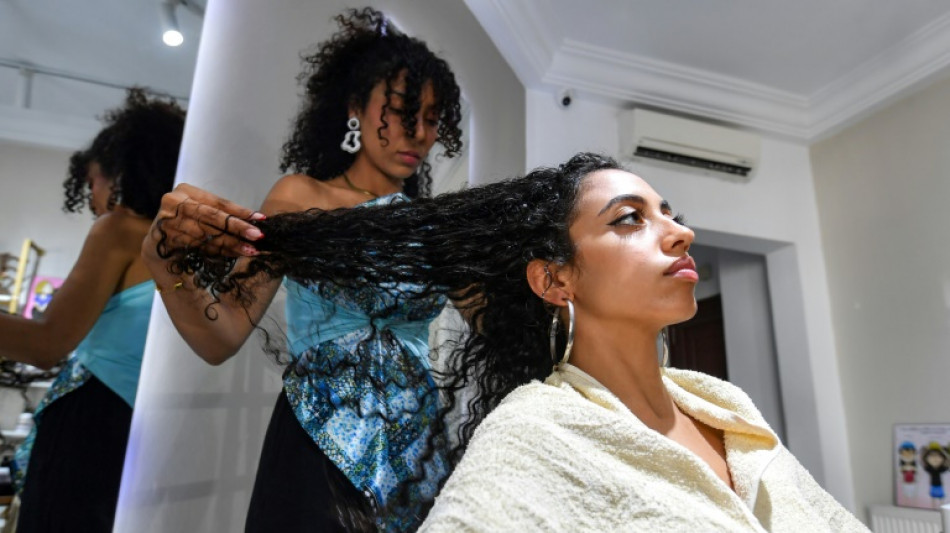
-
 Indian pilgrims find 'warm welcome' in Pakistan despite tensions
Indian pilgrims find 'warm welcome' in Pakistan despite tensions
-
Inter and AC Milan complete purchase of San Siro

-
 Swedish authorities inspect worksite conditions at steel startup Stegra
Swedish authorities inspect worksite conditions at steel startup Stegra
-
Keys withdraws from WTA Finals with illness

-
 Prince Harry says proud to be British despite new life in US
Prince Harry says proud to be British despite new life in US
-
BMW boosts profitability, welcomes Nexperia signals

-
 EU strikes last-ditch deal on climate targets as COP30 looms
EU strikes last-ditch deal on climate targets as COP30 looms
-
Stocks retreat as tech bubble fears grow

-
 Shein opens first permanent store amid heavy police presence
Shein opens first permanent store amid heavy police presence
-
West Indies edge New Zealand despite Santner brilliance

-
 French pair released by Iran await return home
French pair released by Iran await return home
-
German factory orders up but outlook still muted

-
 Death toll tops 100 as Philippines digs out after typhoon
Death toll tops 100 as Philippines digs out after typhoon
-
Attack on key city in Sudan's Kordofan region kills 40: UN

-
 'No one could stop it': Sudanese describe mass rapes while fleeing El-Fasher
'No one could stop it': Sudanese describe mass rapes while fleeing El-Fasher
-
Champagne and cheers across New York as Mamdani soars to victory

-
 Medieval tower collapse adds to Italy's workplace toll
Medieval tower collapse adds to Italy's workplace toll
-
BMW boosts profitability despite China, tariff woes

-
 South Africa's Wiese wary of 'hurt' France before re-match
South Africa's Wiese wary of 'hurt' France before re-match
-
Asian markets sink as tech bubble fears grow

-
 Beyond limits: Croatian freediver's breathtaking record
Beyond limits: Croatian freediver's breathtaking record
-
Tottenham supporting Udogie after alleged gun threat in London

-
 Thunder roll Clippers to stay unbeaten as SGA keeps streak alive
Thunder roll Clippers to stay unbeaten as SGA keeps streak alive
-
In appeal, Australian mushroom murderer alleges 'miscarriage of justice'

-
 Toyota hikes profit forecasts 'despite US tariffs'
Toyota hikes profit forecasts 'despite US tariffs'
-
Typhoon death toll soars past 90 in the Philippines

-
 Ex-France lock Willemse challenges Meafou to become 'the bully'
Ex-France lock Willemse challenges Meafou to become 'the bully'
-
Ukrainians to honour sporting dead by building country they 'died for': minister

-
 At least 7 dead after UPS cargo plane crashes near Louisville airport
At least 7 dead after UPS cargo plane crashes near Louisville airport
-
US Supreme Court hears challenge to Trump tariff powers

-
 US government shutdown becomes longest in history
US government shutdown becomes longest in history
-
India's Modi readies bellwether poll in poorest state

-
 Green goals versus growth needs: India's climate scorecard
Green goals versus growth needs: India's climate scorecard
-
Where things stand on China-US trade after Trump and Xi talk

-
 Sri Lanka targets big fish in anti-corruption push
Sri Lanka targets big fish in anti-corruption push
-
NY elects leftist mayor on big election night for Democrats

-
 Injured Jordie Barrett to miss rest of All Blacks tour
Injured Jordie Barrett to miss rest of All Blacks tour
-
Asian markets tumble as tech bubble fears grow

-
 Pay to protect: Brazil pitches new forest fund at COP30
Pay to protect: Brazil pitches new forest fund at COP30
-
Australia pick 'impressive' Weatherald in first Ashes Test squad

-
 Iraq's social media mercenaries dying for Russia
Iraq's social media mercenaries dying for Russia
-
Young leftist Trump foe elected New York mayor

-
 Concerns at ILO over expected appointment of close Trump advisor
Concerns at ILO over expected appointment of close Trump advisor
-
Venus Williams to return to Auckland Classic at the age of 45

-
 No deal yet on EU climate targets as COP30 looms
No deal yet on EU climate targets as COP30 looms
-
Typhoon death toll climbs to 66 in the Philippines

-
 NATO tests war preparedness on eastern flank facing Russia
NATO tests war preparedness on eastern flank facing Russia
-
Uncapped opener Weatherald in Australia squad for first Ashes Test

-
 Liverpool down Real Madrid in Champions League, Bayern edge PSG
Liverpool down Real Madrid in Champions League, Bayern edge PSG
-
Van Dijk tells Liverpool to keep calm and follow Arsenal's lead


'Curly is beautiful': Tunisian women embrace natural hair
Tunisian mother Mouna Jebali had long used a flat iron to straighten her thick hair, but with women everywhere challenging the stigma around natural looks, she has finally learned to love her curls.
To help her make what she called the "transition" to wearing her hair curly, she visited the North African country's first beauty salon specialising in natural hair.
"For years, I was taught that curly hair was not neat, that it had to be straightened or tied back," Jebali told AFP at Pineapple Studio in the capital, Tunis.
She said she finally came to accept her natural hair after tiny curls started forming on her little boy's head.
"That's when I said to myself: actually no, curly hair is beautiful," she said.
In countries around the world, beauty standards have shifted radically in recent years, with a growing number of beauty salons and cosmetic brands promoting natural styles.
Still, the battle is far from won, and many women in Tunisia still rush to get their hair straightened ahead of a wedding or a meeting, and some fear that if they do not wear their hair straight for a job interview, they might not get hired.
- Indigenous and African -
Advocates for wearing one's natural hair believe that at the root of the stigma around curls lies a form of discrimination that they call "texturism".
"The further you move away from what is considered Afro, kinky or curly, the more socially accepted you are," said Nawal Benali, a journalist and host of a podcast on racism in North Africa.
"Because that's a marker of proper appearance and presentability."
Benali said the standards had first been set in "the white, Western world", calling the obsession around straight hair an attempt to "erase our Indigenous and African features".
Dhouha Mechergui, who co-founded Pineapple Studio, recalled having her hair straightened by her mother ahead of every religious holiday growing up.
She said it took courage to make her own switch to natural, and that she had to work hard to convince women to embrace their curls and come to her salon.
"Sometimes I play the role of psychiatrist, because I know making that decision is very difficult," she said.
Aside from the drive for greater authenticity, health concerns have become a part of the debate, with one major study by the US National Institutes of Health linking chemical hair straightening products to a higher risk of uterine cancer.
- 'We are proud' -
For generations, people around the world were told to straighten, braid, cut or otherwise conceal their curls, or else get sent home from school or work.
A global drive buoyed by the Black Lives Matter movement gave rise to a major pandemic-era trend of beauty videos celebrating natural hair.
The push did not go unnoticed: French lawmakers last year voted to ban discrimination based on hair texture, while several US states have passed similar legislation.
Tunisia has no such initiative, so women entrepreneurs are leading the change.
In 2021, Sirine Cherif cofounded Kamaana -- or "as I am" -- Tunisia's first homegrown haircare brand dedicated to curly locks.
"When we started, we were the only specialised brand on the market," she said.
"A few months later, there was a domino effect: bigger brands launched their own curly-hair lines."
And today, Tunisian companies such as Zynia and Lilas Cosmetics have joined the growing industry.
For Cherif, the boom is both a lucrative business opportunity and a marker of profound social change.
"We are proud to have encouraged people to be themselves, to resist this societal pressure and embrace their natural hair," she said.
Her company has seen 42-percent annual growth since its founding, she said, adding: "We want to start a curl revolution."
T.Ibrahim--SF-PST
